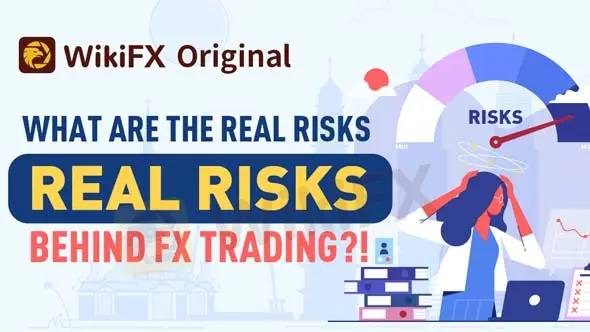简体中文
繁體中文
English
Pусский
日本語
ภาษาไทย
Tiếng Việt
Bahasa Indonesia
Español
हिन्दी
Filippiiniläinen
Français
Deutsch
Português
Türkçe
한국어
العربية
What Are The Real Risks Behind FX Trading?!
Abstract:The first rule of Forex trading, or any other type of trading for that matter, is to only risk money you can afford to lose. Many traders, particularly beginners, disregard this rule because they believe it "won't happen to them." However, there are numerous risks associated with forex trades because they are leveraged products that can result in significant losses

When you use debt to fund your trades, you engage in leveraged or marginal trading. Both of these activities significantly increase the risk you take and the likelihood that you will owe much more than you did initially.
The amount of capital you could lose in a single trade, as opposed to the risks mentioned previously, is referred to as trade risk. It is calculated by multiplying the position size by the pip value by the difference between your entry price and the price at which your stop-loss order takes effect.

While you can use leverage to fund your trades and be successful, the risks are so high that not using leverage is the best way to manage the risks involved.
The 1% rule is one of the most effective methods for reducing trade risk. If you have $10,000 in your account, the most you should risk on a trade is $100. If you have $20,000 in your account, you should not risk more than $200 per trade.
On the other hand, another type of risk that many traders often overlook is the risk of being caught in the trap of scam forex brokers. It is crucial to always do your due diligence before engaging with any forex broker. Nowadays, you only need a few seconds and a few clicks to start your research. It could be as simple and efficient as downloading the free WikiFX app from Google Play or App Store and then looking up that broker in question in our database. This straightforward and self-explanatory method could save you a lot of future trouble.

Disclaimer:
The views in this article only represent the author's personal views, and do not constitute investment advice on this platform. This platform does not guarantee the accuracy, completeness and timeliness of the information in the article, and will not be liable for any loss caused by the use of or reliance on the information in the article.
Read more

CME International Records a Massive Jump in Forex Volumes
CME International recorded a record surge in its foreign exchange trading volumes during the second quarter. Check out its performance across products and markets.

Scam Brokers Exposed! FCA Warns Traders to Stay Safe
If you are into forex trading, you need to protect your money from investment scams. Many scam brokers are active in the market now. The FCA, a reputed financial regulator, has issued a list of unlicensed brokers you need to stay away from.

New to Forex Trading in India? Here's How You Can Start and Maximize
Want to begin your forex trading journey in India? Here's a guide that will help you open and close trading positions effectively, resulting in enhanced returns and minimized risks.

How a TikTok Crypto Scam Cost One Investor RM84,000
A Malaysian woman has lost RM84,000 after falling prey to a cryptocurrency investment scam promoted through the social media platform TikTok. The 52-year-old victim was lured into the scheme by a fraudster posing as an investment advisor, according to police reports filed earlier this week.
WikiFX Broker
Latest News
Alchemy Markets Review 2025: Key Facts and Insights
Largest Market Makers
Temasek's portfolio scales new peak even as divestments hit over 2-decade high
Exposing Trade Capital Limited - Siphoning Millions, Restricting Withdrawals, Charging Extra Fees
GMI Edge: A Closer Look at Its Licenses
How Do I Place a Stop-loss Order?
5 Serious Warnings About Mirrox! You Can’t Afford to Ignore
FXPRIMUS: 5 Things They Don’t Want You to Know
Manual vs. Automated Forex Trading: Which One Should You Choose?
Mining firms lift FTSE 100 to record high after Trump confirms 50% copper tariff
Currency Calculator


